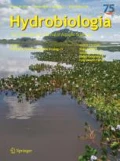In March 2013 (15th–21st), the Editors and Publishers of Hydrobiologia organised the first international conference on “Challenges in Aquatic Sciences” in Keelung (Taiwan). The host institute was the “Institute of Marine Biology, National Taiwan Ocean University”. There were more than 400 registered participants from 44 countries. 122 talks (in two parallel sessions) and 171 posters were scheduled, divided over 15 main scientific themes.
The main idea of the meeting was to provide Asian aquatic scientists with an opportunity to present their research to the world, and to get in touch with each other as well as with non-Asian colleagues. This goal was certainly reached, and several new collaborations have been initiated during this successful meeting. The present special issue of Hydrobiologia comprises a small subset of the great variety of topics that has been addressed in Keelung. Nevertheless, these papers give a good representation of the types of challenges that have been discussed, and we are especially proud that this special issue very much has an ‘Asian’ touch to the topics presented, with special attention to toxins and algal blooms (6 papers), or water quality in general, invasive species (2 papers) and various aspects of the ecology of marine plankton (5 papers). Topics like climate change, disease control and effects of aquaculture each added one paper to the present proceedings.
It is our pleasure to acknowledge financial support from Springer, as well as from National Science Council, Taiwan; National Science Council Research Promotion Centre for Life Sciences, Taiwan; Bureau of Foreign Trade, Taiwan; Taiwan Ocean Research Institute; Environmental Protection Administration, Taiwan; Fisheries Agency, Council of Agriculture, Taiwan; Mainland Affairs Council, Taiwan; Ministry of Education, Taiwan and Ministry of Foreign Affairs, Taiwan.
Special acknowledgements are due to the editors of Hydrobiologia, for enthusiastically attending the conference and for extensive help with the refereeing process of the submitted papers. Of course, many thanks also to all participants and speakers.
May this conference be well remembered by all. We are already looking forward to the Challenges II meeting!
Author information
Authors and Affiliations
Corresponding author
Additional information
Guest editors: Jiang-Shiou Hwang & Koen Martens / Challenges in Aquatic Sciences
Rights and permissions
About this article
Cite this article
Hwang, JS., Martens, K. Preface. Hydrobiologia 741, 1 (2014). https://doi.org/10.1007/s10750-014-2064-5
Published:
Issue Date:
DOI: https://doi.org/10.1007/s10750-014-2064-5

